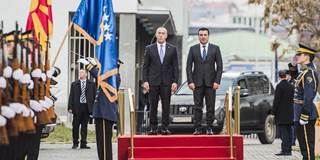Western Balkan countries have made significant progress since the 1990s, when ethnic violence tore the region apart and necessitated an international intervention. But that progress is fragile, and could easily be reversed without a renewed push to put these countries on the road to European Union membership.
BRUSSELS – On January 16, representatives of Serbia and Kosovo met in Brussels for confidence-building talks. But, on that same day, the Kosovo Serb minority leader Oliver Ivanović was shot dead in the Serb-administered section of Mitrovica, in Northern Kosovo, and the talks were called off.
Since the end of the Kosovo War in 1999, the Western Balkans have made much progress in facing down the nationalist and reactionary forces that gave rise to that brutal ethnic conflict. But Ivanović’s assassination, most likely at the hands of criminal gangs that have been allowed to prosper in Northern Kosovo, now threatens to throw fuel on a still-smoldering fire. The region’s nationalist ghosts are being roused from their slumber.
Western Balkan countries are struggling to confront many other challenges as well. Corruption is rife, owing to organized-crime networks that grew out of the communist-era security apparatus. The influence of the United States in the region is declining, even as Russia becomes more revanchist. And, for most of the region’s countries, a big question mark hovers over the path to European Union accession.

BRUSSELS – On January 16, representatives of Serbia and Kosovo met in Brussels for confidence-building talks. But, on that same day, the Kosovo Serb minority leader Oliver Ivanović was shot dead in the Serb-administered section of Mitrovica, in Northern Kosovo, and the talks were called off.
Since the end of the Kosovo War in 1999, the Western Balkans have made much progress in facing down the nationalist and reactionary forces that gave rise to that brutal ethnic conflict. But Ivanović’s assassination, most likely at the hands of criminal gangs that have been allowed to prosper in Northern Kosovo, now threatens to throw fuel on a still-smoldering fire. The region’s nationalist ghosts are being roused from their slumber.
Western Balkan countries are struggling to confront many other challenges as well. Corruption is rife, owing to organized-crime networks that grew out of the communist-era security apparatus. The influence of the United States in the region is declining, even as Russia becomes more revanchist. And, for most of the region’s countries, a big question mark hovers over the path to European Union accession.